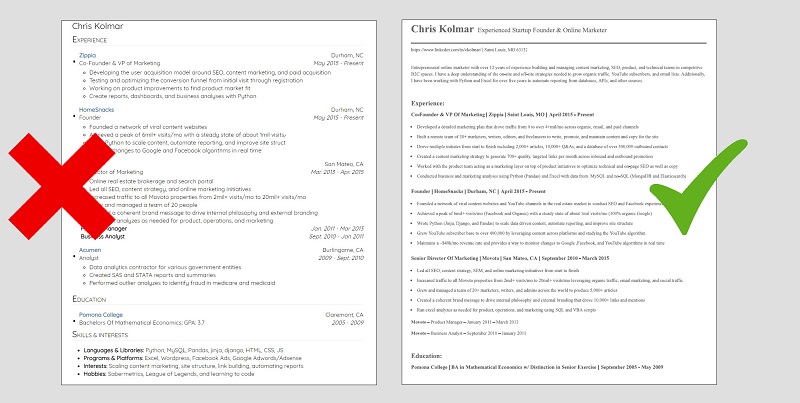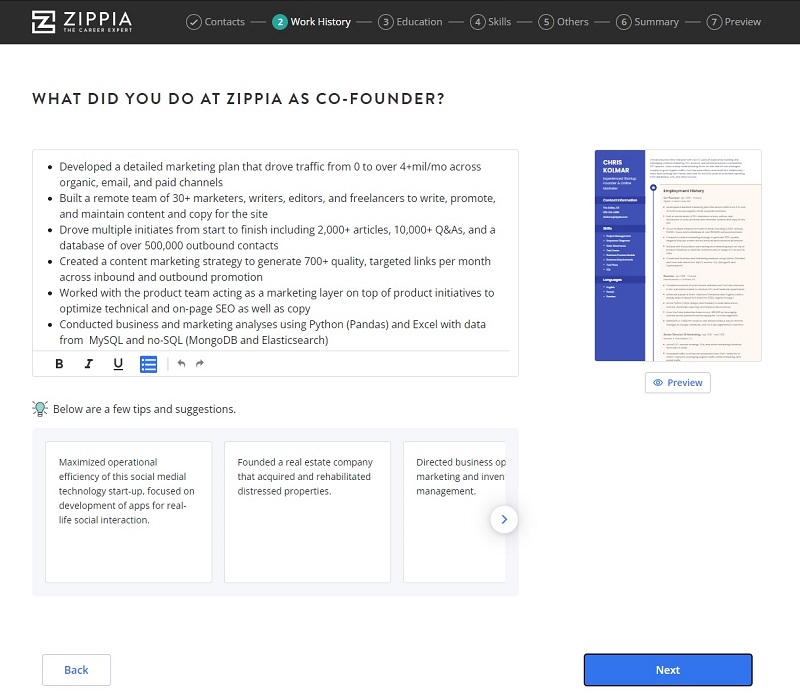- Parts Of A Resume
- How To Write A Resume
- Resume Skills Section
- Resume Objective Section
- Career Objective Section
- Resume Reference Section
- Resume Summary Section
- Resume Summary Example
- Resume Interests Section
- Address On Resume
- Relevant Work Experience
- Anticipated Graduation Date On Resume
- Education Section On Resume
- Contact Information On Resume
- Statement Of Qualifications
- How To List Publications On Resume
- Accomplishments On Resumes
- Awards On Resume
- Dean's List On Resume
- Study Abroad On Resume
- Resume Format
- Resume Templates
- General Resume Examples
- Resume Builder
- Resume Format
- Resume Margins
- Resume Header
- Work Experience On Resume
- Irrelevant Work Experience
- Listing Languages On Resume
- Volunteer Work On Resume
- GPA On Resume
- Resume Title
- Summary Of Qualifications
- Resume Picture
- Python Project On Resume
- Google Docs Resume Template
- Professional Bio On Resume
- Multiple Positions At Same Company
- Relevant Coursework Resume
- Where And How To Put Internships On Your Resume
- Professional Resume Formats
- Resume Types
- What to List in Your Resume’s Education Section
- Employers Perform An Education Background Check
- Update Your Resume Now To Get Your Next Job Faster
- Resume Education Section FAQ
- Where to Put Your Education Section on Your Resume
- Should You Include Education in Your Cover Letter?
- Resume Education Section Template
- Examples of Resume Education Sections
- Resume Education Section Tips
- How to Proofread Your Resume
- Final Thoughts
- Sign Up For More Advice and Jobs
Does the education section of your professional resume make the grade?
Savvy job seekers know that it’s important to update your resume regularly, and updating the education section of your resume is no exception.
During your job search, carefully research and analyze the required qualifications for listings. Many hiring managers require that you meet a minimum job requirement to qualify for a job. So before you apply for a job, confirm that you have the education and experience required for the role.
If you don’t have a college degree, some recruiters will just toss out your resume. Emphasize your education. Advanced degrees impress employers and often relate directly to higher salaries.
Here is a precise, step-by-step set of instructions for how to write a resume and craft the perfect education section.
Want to save time and have your resume ready in 5 minutes? Try our resume builder. It’s fast and easy to use. Plus, you’ll get ready-made content to add with one click. See 10+ resume templates and create your resume here.

One of users, Diana, had this to say:
I was guided on how to make a detailed and professional resume on Zippia. I was able to download it with unlimited access to all features.
What to List in Your Resume’s Education Section
When it’s time to create or update your resume a lot of questions come to mind. The first question is “what information do I need to share about my education?”
Gathering the details of what you should include about your education is simple. Here’s the information that hiring managers will want to know about your education on your resume.
-
Degrees listed in chronological order
-
High School, College, or University Name
-
Educational Institution Location (City and State)
-
Major/Minor/Field of Study
-
GPA (if above 3.5)
-
Honors: cum laude (3.900 or higher), magna laude(3.700-3.899), summa laude (3.900 or higher)
-
Awards or distinctions (Honor Society, President’s Award, Dean’s List, etc.)
-
Scholarships (Academic, Merit, Athletic or Community Service Scholarships)
Employers Perform An Education Background Check
Many prospective employers will do a background check on job-seekers so you should avoid lying on your resume. They will verify an applicant’s education and degrees as a part of that process.
Unfortunately, some applicants will lie about earning a degree. Furthermore, some candidates will present a phony diploma to an employer. This dishonestly is why employers have to make sure you have the educational credentials you claim to have.
Here’s a list of other things you should avoid putting on your resume.
Update Your Resume Now To Get Your Next Job Faster

Resume Education Section FAQ
There is an exception to every rule. That’s why we have listed the answers to some common questions that people have regarding listing their education.
-
Should you spell out your degree? Yes! Rather than put B.S. or B.A. it’s better to spell out your degree.
-
Do you use an apostrophe in your degree? If you say Master’s Degree or Bachelor’s Degree then you use an apostrophe. If you use the word of, then you don’t. For example Master of Business Degree or Bachelor of Arts Degree.
-
Should you include your high school graduation information? If you are a recent high school graduate who has not earned a college degree, then create a resume that lists your high school education. However, if you have earned a college degree, then it’s recommended you omit your high school information.
-
Should you include the year you graduated from college? Job seekers aged 19-39 can list their college graduation dates. But after you hit 40 years old, it’s recommended to drop the date so hiring managers don’t discriminate against you unfairly.
For example, Rodney Dangerfield in the movie “Back to School” was a fun-loving and obnoxious rich middle-aged man who decided to attend school with his son. Listing this degree on his resume would more likely harm him rather than help him get a job. Check here for information on how far back should a resume should go.
-
What if you never graduated? If you attended college for a couple of years but did not complete your degree, you can still list the dates that you attended there.
-
Should you list your anticipated graduation? Absolutely. If you are currently attending college and have an anticipated graduation date you can include that on your resume.
-
What if you didn’t make the Dean’s list all semesters? Can you still include it? While it may be tempting to show off the one semester you reached the Dean’s list, it’s better to include that honor on your resume only if you made it all semesters you attended school.
-
Should you list advanced degrees that you are pursuing? Employers love to see when applicants are investing in their further education. Showing that you are pursuing a Master’s or a Doctorate can help explain a job gap too.
-
Should you embellish things in your education section? Don’t be like Al Bundy from Married with Children who was always hyping his high school football fame.
Lying about your education or work experience on a resume is a bad idea. Many employers will verify your college degree. If an employee checked your background and found that out to be not true, you would immediately be terminated.
Where to Put Your Education Section on Your Resume
The placement of your resume’s education section depends on your experience level, how recently you were a student, and what sort of role you’re applying for. Below are some tips and resume examples to help you determine the best place to locate your education section.
-
High school student or recent graduate. If you are attending high school, college, or soon to graduate college, you’ll want to include your education section near the top. No matter who you are, you should lead off your resume with your contact information and a resume objective or summary statement.
If you’re a current student or a recent graduate, you can then move into your education section.
Place your education section above your professional experience. Since you will be applying for an entry-level job and have very little relevant job experience to show, you want to showcase your education as the first thing recruiters see.
Note that this works best for those without much formal work experience — if you’re a college student or recent graduate who has some impressive internships and other work experiences under your belt, it’s probably best to open with your professional experience over your education.
High school graduates can also list their education in the objective section or resume summary statement at the top, and should follow with a short but dedicated education section.
Additionally, those applying for roles in academic, research-based, or scientific roles might also opt to lead with their education section, since that’s probably the most relevant information for the hiring manager or recruiter. Remember — the ultimate goal of any resume is to present the most noteworthy aspects of your professional prowess as prominently as possible.
-
College graduates with some experience. Once you have your college degree and some experience with jobs in your industry, then you can list your education after your professional experience section.
New college graduates can mention their degree in their resume objective or summary statement as well. As for your actual education section, it depends on your level of professional experience.
Again, work-related, on-the-job experience is more impressive, relevant, and important than your educational credentials (for most hiring managers and most jobs, anyway). But if you feel that your education section will work better to sell your credentials, then by all means open with it.
-
Seasoned job seekers. Those with more experience don’t need to mention their education in their resume summary statement because their professional experience is a stronger credential. However, hiring managers and recruiters still expect to see an education section on your resume, usually between your professional experience and skills sections.
Note that the placement of your resume’s education section is somewhat based on the role you’re applying for and your background.
Those applying to academic or research positions might lead with their education section (immediately after their summary statement), while those who are applying for highly technical positions may opt to put their skills section first and conclude with an education section.
Always consider what information is most relevant and impressive for the hiring manager who will be reading your resume.
Then again, there’s one more thing you can do.
Make a new resume and get more interviews.
Plus, a great resume will give you an advantage over other candidates. You can write it in our resume builder here. Here’s what it may look like:
Should You Include Education in Your Cover Letter?
Most of your resume cover letter should be focused on your relevant skills and work experience. But you can mention aspects of your education and how they would translate to job-related skills.
For example, if you got a Bachelor’s in Communications with a focus on Mass Communications, you could mention in your cover letter the transferable skills you gained during your college television production experience and how it applies to the TV production studio job that you are applying for.
Resume Education Section Template
To create a winning resume, you need to know how to write an effective education section and what information to include in it.
To make it easy, here is a template of what to include in the education section of your resume along with some examples below for different situations.
School or University
City, State
Degree Earned / Minor – (Most-recent degree listed first)
GPA (if over 3.5)
Honors/Awards
Examples of Resume Education Sections
-
Here is a sample education section from someone who graduated with a 4-year degree from college.
Western Illinois University
Macomb, Illinois
Bachelor of Science in Criminal Justice / Minor in Psychology
Graduated magna cum laude
Cumulative GPA of 3.95
Dean’s List all semesters -
Here is a sample education section from someone who has earned two degrees:
Northwestern University
Evanston, Illinois
Master of Business Administration May 2020
GPA of 3.75The University of Illinois at Urbana–Champaign
Champaign, Illinois
BS in Business, Business Administration May 2016
GPA of 3.8 -
Here is a recommended education section from someone who is still pursuing their degree with a future graduation date:
DePaul University
Chicago, Illinois Bachelor of Arts in Communications, degree anticipated December 2020
Current GPA of 3.65 -
If you are an older job seeker, do not list the dates you earned your degrees. If hiring managers feel you are too old, they may look past you for a younger candidate:
University of Chicago
Chicago, Illinois
Bachelor of Business Administration -
Here is an example of an education section from an individual who just graduated high school:
Burlington High School
Burlington, Iowa
2016-2020
President of Student Council
And here are two example resume objective statements that incorporate educational experience:
-
Hard-working high school graduate with 1-year experience in retail seeks a job in customer service. Possess strong communication skills, attention to detail, and sales experience.
-
Highly motivated Bachelor of Arts graduate with a 3.5 GPA seeking a role with a Public Relations business. Brings strong interpersonal skills and proven experience directing media campaigns.
Resume Education Section Tips
Follow these tips to make your resume’s education section look great for hiring managers and recruiters:
-
Read the job description carefully. Specifically, look for any “requirements” or “education” sections in the job posting. Most jobs don’t specify much more than “bachelor’s degree required” or something similar, but some jobs do require certain certifications or degrees.
If you’re going for a role like this, say in health care or pharmaceutical research, you may want to lead with these important educational credentials to make sure the hiring manager knows you’re a suitable candidate right off the bat.
-
Don’t lie. Educational background checks are one of the easiest things employers do to verify your information. Being caught in a lie is a surefire way to remove yourself from the candidate pool.
-
Start strong. You should almost always lead with your highest level of education and work your way backward. The only caveat to this is when your highest degree isn’t relevant to the position you’re applying for, but a more recent, less prestigious certification is relevant. In that case, relevancy wins out and you should lead with that certification.
-
Drop the multiple schools for one degree. If you hopped around a few times to get some credits here and there, don’t go writing an autobiography about it. Keep things simple; just list where you ended up getting the degree from.
-
Consider breaking down your education section. If you have a lot of impressive collegiate or post-graduate experience under your belt and it’s all relevant to the job you’re applying for, you can start thinking about breaking down your education section into subsections. Things like “projects,” “continuous education,” “awards,” etc. can all make good subheaders.
Note that you shouldn’t be so extensive with an education section unless it really does trump the value of your professional experience section.
How to Proofread Your Resume
Now that you’ve updated your resume with your education section, it’s time to prove it.
Catching any typos, grammar errors, bad formatting, and other mistakes is important. You can be the best candidate in the world, but if your resume is full of typos, spelling errors, and other mistakes your resume will get tossed.
15 easy tips to proofread your resume effectively:
-
Make your resume mistake-free by running the spelling and grammar check on your word processor.
-
Double Check your Resume. Paste your resume into Grammarly – a free online tool for grammar, spell checking, and punctuation. It analyzes your writing and suggests improvements.
-
Verb Agreement. Ensure that you areadding strong action verbs on your resumefor current jobs and past tense for all previous jobs. Click here for examples onresume tense past and present?
-
Verify all contact-information.
-
Delete any accidental double spacing between words and sentences.
-
Make sure resume margins are consistent.
-
Double-check that all company names are correct.
-
Review all job titles.
-
Ensure that all employment dates are correct
-
Make sure all college names and locations are listed
-
Spell out states, street, avenue. Don’t use any abbreviations.
-
Verify resume format for consistency of fonts including size, type, and weight.
-
See if paragraph spacing, line spacing, and linebreak sizes are consistent throughout the resume.
-
Print out and review your resume by reading through it slowly. Check that all formatting is consistent.
-
Ask a friend to check your resume for errors. They can offer a resume critique with a fresh set of eyes and offer suggestions.
Final Thoughts
Today’s job market is competitive. Leverage these tips and tricks and write a resume that gets you noticed and lands you a job interview. Whether you’re a new graduate looking for your first job, your education is your biggest asset. If you are a seasoned veteran looking to make your next career move, your education can help you stand out.
So follow the simple steps outlined above to create an effective resume education section that gets you one step closer to landing the job you want.
- Parts Of A Resume
- How To Write A Resume
- Resume Skills Section
- Resume Objective Section
- Career Objective Section
- Resume Reference Section
- Resume Summary Section
- Resume Summary Example
- Resume Interests Section
- Address On Resume
- Relevant Work Experience
- Anticipated Graduation Date On Resume
- Education Section On Resume
- Contact Information On Resume
- Statement Of Qualifications
- How To List Publications On Resume
- Accomplishments On Resumes
- Awards On Resume
- Dean's List On Resume
- Study Abroad On Resume
- Resume Format
- Resume Templates
- General Resume Examples
- Resume Builder
- Resume Format
- Resume Margins
- Resume Header
- Work Experience On Resume
- Irrelevant Work Experience
- Listing Languages On Resume
- Volunteer Work On Resume
- GPA On Resume
- Resume Title
- Summary Of Qualifications
- Resume Picture
- Python Project On Resume
- Google Docs Resume Template
- Professional Bio On Resume
- Multiple Positions At Same Company
- Relevant Coursework Resume
- Where And How To Put Internships On Your Resume
- Professional Resume Formats
- Resume Types





